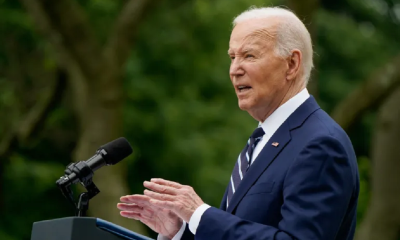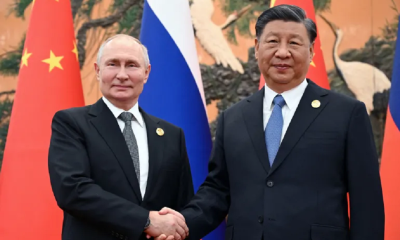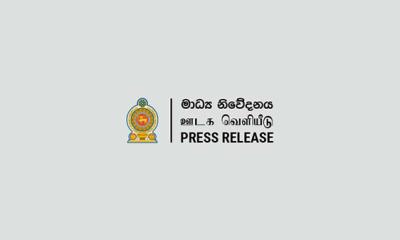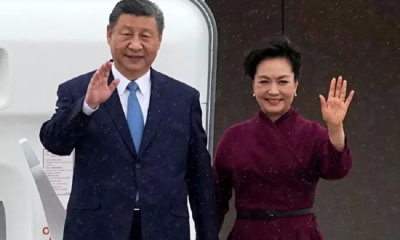News
Forbes: Lanka, Pakistan and Maldives among biggest debt burdens to China
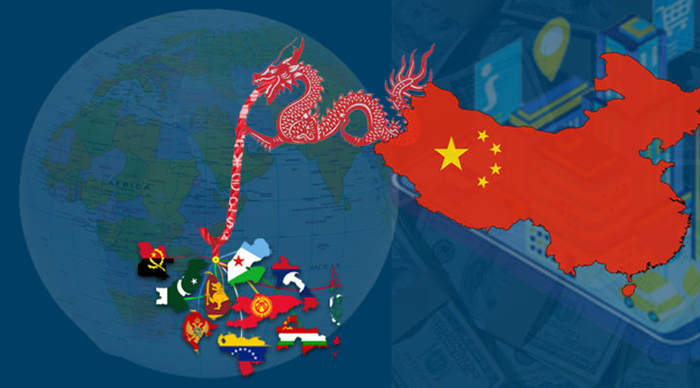
Sri Lanka, Pakistan and Maldives in South Asia stand neck-deep in the Chinese debt. Pakistan has $77.3 billion of external debt to China while Maldives amounted to 31 per cent of Maldives’ Gross National Income (GNI). Maldives’ total debt amounts to MVR 86 billion by the end of 2020, MVR 44 billion of which is external debt, said a report by the Forbes.
Forbes, collecting data from The World Bank report as of 2020, says that 97 countries across the globe are under Chinese debt. Countries heavily in debt to China are mostly located in Africa, but can also be found in Central Asia, Southeast Asia and the Pacific.
China is reaching most of the countries under the One Belt and Road scheme. The world’s low-income countries owe 37% of their debt to China in 2022, compared to just 24% in bilateral debt to the rest of the world.The Chinese global project to finance the construction of the port, rail and land infrastructure across the globe, has been a major source of debt to China for participating countries.
Those with the highest external debt to China are Pakistan $77.3 billion, Angola at 36.3 billion, Ethiopia $7.9 billion, Kenya $7.4 billion and Sri Lanka $6.8 billion.
Maldives newspaper reported that according to statistics released by the Finance Ministry, Maldives’ debt rose to MVR 99 billion by end of Q1 2022. It made up 113 per cent of GDP. The projects in the Maldives funded with loans from China include the construction of the Sinamale Bridge and the airport development project.
Bangladesh too is a part of China’s Belt and Road Initiative. Dhaka owes 6 per cent of its total foreign debt to Beijing, which is around $4 billion. According to a report from FT, Bangladesh is seeking a first instalment from the IMF of $1.5 billion, as part of a total package worth $4.5billion.” This amount would include a financial line to help it fund climate change resilience projects and buttress its budget,” reads the report. According to the IMF, Bangladesh had a total foreign debt of $62 billion in 2021. The majority of the debt is owed to multilateral lenders such as the World Bank.
The countries with the biggest debt burdens in relative terms were Djibouti and Angola, where debt to China exceeded 40% of gross national income, an indicator similar to GDP but also including income from overseas sources.The equivalent of 30% of GNI or more in Chinese debt affects the Maldives and Laos, with the latter just having opened a railway line to China which is already causing debt issues for the country.
Sri Lanka May 2022 was the first country in two decades to default on its sovereign debt. Chinese debt to Sri Lanka was the fifth-highest overall in late 2020 and amounted to 9% of the country’s GNI. According to the Financial Times, which called the development in Sri Lanka and elsewhere China’s first overseas debt crisis, the country had to renegotiate loans worth $52 billion in 2020 and 2021—more than three times the amount that met this fate in the two previous years.
China has provided record amounts of financing to developing countries over the past two decades, supporting both public and private sector projects. The Belt and Road Initiative is President Xi Jinping’s flagship foreign policy initiative; launched in 2013 to invest in almost 70 countries and international organizations, it has propelled China to global dominance in international development finance.
China’s Belt and Road Initiative has caused dozens of lower- and middle-income countries to accumulate $385 billion in “hidden debts” to Beijing, a new study has claimed.AidData, an international development research lab based at Virginia’s College of William & Mary, says 13,427 Chinese development projects worth a combined $843 billion across 165 countries, over 18 years to the end of 2017.
China has faced criticism for its lending practices to poorer countries, accused of leaving them struggling to repay debts and therefore vulnerable to pressure from Beijing. China rejects this criticism and calls it as “propaganda/narrative of the vested interested countries” to tarnish its image.
News
US sports envoys to Lanka to champion youth development

The U.S. Embassy in Colombo welcomed the U.S. Sports Envoys to Sri Lanka, former National Basketball Association (NBA) and Women’s National Basketball Association (WNBA) players Stephen Howard and Astou Ndiaye, from June 8 through 14.
The Public Diplomacy section of the U.S. Embassy said that it would launch a weeklong basketball program intended to harness the unifying power of sports, made possible through collaboration with Foundation of Goodness and IImpact Hoop Lab.
While in Sri Lanka, Howard and Ndiaye, both retired professional basketball players, will conduct a weeklong program, Hoops for Hope: Bridging Borders through Basketball. The Sports Envoys will lead basketball clinics and exhibition matches and engage in leadership sessions in Colombo and Southern Province for youth aged 14-18 from Northern, Uva, Eastern and Western Provinces, offering skills and leadership training both on and off the court. The U.S. Envoys will also share their expertise with the Sri Lanka Basketball Federation, national coaches, and players, furthering the development of basketball in the country. Beyond the clinics, they will collaborate with Sri Lankan schoolchildren to take part in a community service project in the Colombo area.
“We are so proud to welcome Stephen and Astou as our Sports Envoys to Sri Lanka, to build on the strong people-to-people connections between the United States and Sri Lanka,” said U.S. Ambassador Julie Chung. “The lessons that will be shared by our Sports Envoys – communication, teamwork, resilience, inclusion, and conflict resolution – are essential for leadership development, community building, equality, and peace. The U.S. Sports Envoy program is a testament to our belief that sports can be a powerful tool in promoting peace and unity.”
News
Rahuman questions sudden cancellation of leave of CEB employees

SJB Colombo District MP Mujibur Rahuman in parliament demanded to know from the government the reasons for CEB suspending the leave of all its employees until further notice from Thursday.
MP Rahuman said that the CEB has got an acting General Manager anew and the latter yesterday morning issued a circular suspending leave of all CEB employees with immediate effect until further notice.
“We demand that Minister Kanchana Wijesekera should explain this to the House. This circular was issued while this debate on the new Electricity Amendment Bill was pending. There are many who oppose this Bill. The Minister must tell parliament the reason for the urge to cancel the leave of CEB employees,” the MP said.However, Speaker Mahinda Yapa Abeywardena prevented Minister Wijesekera responding to the query and said that the matter raised by MP Rahuman was not relevant.
News
CIPM successfully concludes 8th Annual Symposium

The Chartered Institute of Personnel Management (CIPM) successfully concluded the 8th Annual CIPM Symposium, which took place on 31st May 2024. Themed “Nurturing the Human Element—Redefining HRM in a Rapidly Changing World,” the symposium underscored the pivotal role of human resource management (HRM) in today’s dynamic global landscape. Since its inception in 1959, CIPM has been dedicated to advancing the HR profession through education, professional development, and advocacy, solidifying its position as Sri Lanka’s leading professional body for HRM.
Ken Vijayakumar, the President of the CIPM, graced the occasion as the chief guest. The symposium commenced with the welcome address by the Chairperson, Prof. Arosha Adikaram, followed by the Web Launch of the Symposium Proceedings and Abstract Book by the CIPM President. The event featured distinguished addresses, including a speech by Chief Guest Ken Vijayakumar, President of CIPM, and an address by Guest of Honor Shakthi Ranatunga, Chief Operating Officer of MAS Holdings Pvt. Ltd., Sri Lanka.
The symposium also featured an inspiring keynote address by Prof. Mario Fernando, Professor of Management and Director of the Centre for Cross Cultural Management (CCCM) at the University of Wollongong, Australia.
Vote of Thanks of the inauguration session was delivered by Dr. Dillanjani Weeratunga, Symposium Co-chair.
The symposium served as a comprehensive platform for researchers to present their findings across a wide range of critical topics in HRM. These included Cultural Diversity and Inclusion, Talent Development and Retention, Ethical Leadership and Corporate Social Responsibility, Adapting to Technological Advancements, Mental Health and Well-being at Work, Global Workforce Challenges, Employee Empowerment, and Reskilling and Upskilling.
The plenary session was led by Prof. Wasantha Rajapakse. Certificates were awarded to the best paper presenters during the valedictory session, followed by a vote of thanks delivered by Kamani Perera, Manager of Research and Development.
The annual symposium of CIPM was a truly inclusive event, attracting a diverse audience that spanned undergraduates, graduates, working professionals, research scholars and lecturers. This widespread interest highlights the symposium’s significance in the field of HRM, offering a unique opportunity for everyone to network and learn from scholarly brains.The CIPM International Research Symposium was sponsored by Hambantota International Port, Sri Lanka Institute of Information Technology (SLIIT), E B Creasy & Co. PLC, and Print Xcel Company.




